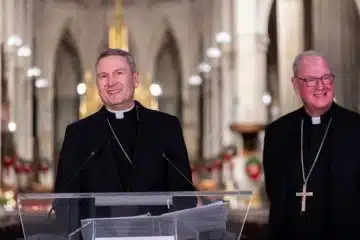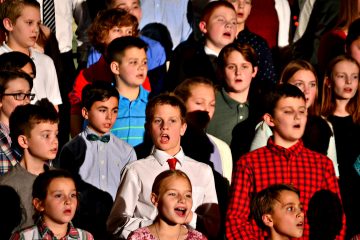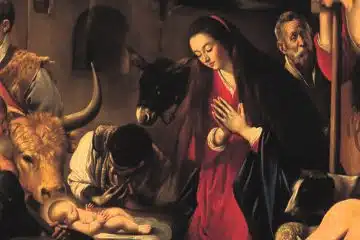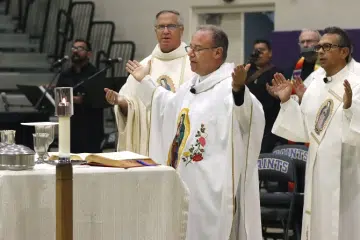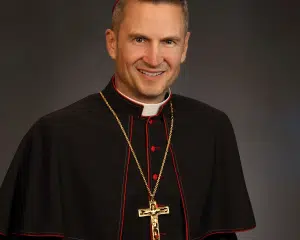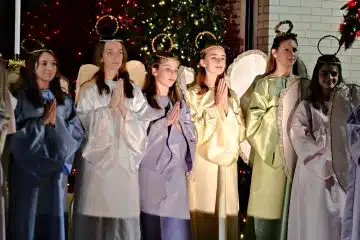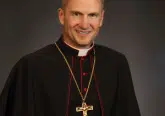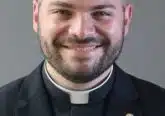Faith formation, service key to Catholic education
Friday, January 29, 2010
By David Eck
ARCHDIOCESE — As a student at St. John the Evangelist School in Deer Park more than 30 years ago Paul Keels remembers the Sisters, the school Masses and how religion was mixed in with the ABCs.
Faith formation is a key component at Catholic school, from the earliest elementary grades through high school and college.
 |
| Mother of Mercy High School’s FCCLA (Family, Career and Community Leaders of America) organization prepared a dinner for the mothers and children at Bethany House in Fairmount. The FCCLA officers went to Bethany House to serve the meal and then lead a craft time for the children. Pictured from left are Becky Riegler, Victoria Muccillo, Annamarie Mosier, Michelle Rollison, Madeline Tucker, Lisa Merz, Mary Rose Leisring and Erin Rowekamp. (Courtesy photo) |
“At that very young age, beginning in fifth-grade, it provided exposure for myself and my siblings to the basics of the Catholic faith and how it tied into education,” Keels, who is now an Ohio State University and Cincinnati Reds broadcaster, wrote in an email to The Catholic Telegraph.
“Certainly it was something we couldn’t comprehend at the time, but it became an important part of what was to come in later school years,” he said. “Not only did the Catholic education teach the history of what formed our religious beliefs, but also taught the importance of having the sacraments as part of everyday life.”
Catholic schools in the archdiocese and around the country incorporate faith formation, sharing of one’s talents and spiritual development in their curriculums, administrators say. Students are given opportunities for service projects, teachers can incorporate social justice discussions into their classes and prayer is part of each day.
It’s what helps set them apart from other schools.
Moeller High School principal Blane Collison spent more than a decade working as a teacher, coach and administrator in a public school system before entering Catholic education as principal of a parish grade school. He views Catholic education as a ministry.
“I chose to leave because of the formative aspect,” Collison said. “Public education does a good job of educating, but they don’t have the ability to do faith formation. It’s a huge part. It’s the core of what we do.”
Keels, a 1975 Moeller graduate, wrote that faith formation in high school carried over into his adult and professional life.
“The time at Moeller taught me about learning to co-exist with others who may have similarities, but most importantly, who have differences,” he wrote. “(I learned) that one’s faith can help get (him or her) through times that may not only be challenging, but also can be rewarding.”
Moeller graduates are taught life lessons, including service to others, and that we are called to share our God-given talents with others and affect other people for the better, Collison said.
“You don’t have to go out and save the world but you do have to make a difference,” he said. “We’re trying to educate students while building up the kingdom of God. That’s what makes it so challenging.”
At Elder High School in Cincinnati, Principal Tom Otten has worked at the school for more than 40 years. An Elder graduate, he came back to his alma mater to begin his career and never left.
“I have the freedom to be part of a school that carries the ability to reinforce values that are taught at home. We can do things that the public schools can’t,” Otten said. “That whole (spiritual) side of our person needs to be developed. I don’t see that public education has the opportunity to do that.”
Service opportunities at Elder, such as tutoring, mission trips and nursing home visits, help instill the concept of giving back to society.
“If you don’t practice that at high schools it’s unlikely that you’re going to find some engagement in giving back as an adult,” Otten said. “High school provides those opportunities.”
At Mercy High School prayer is part of each day. Prayers are said before each class and students lead an all-school prayer each morning. The school’s five values — faith, service, leadership, compassion and excellence — are put into practice and students take an active role in the school’s service projects.
“I think the value that’s added by a student being able to share their faith during the school day with their peers and their teachers has a far longer reaching impact on their development,” said Kirsten MacDougal, Mercy president. “It reinforces what parents are teaching at home. It really makes all the difference in long-lasting values.”
David Eck can be reached at [email protected].


